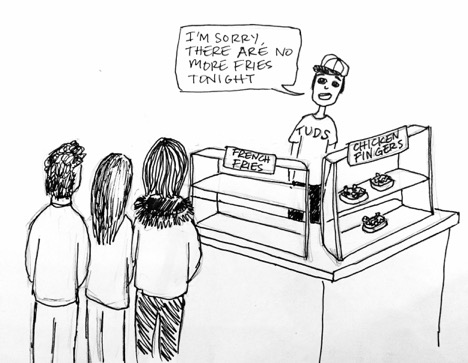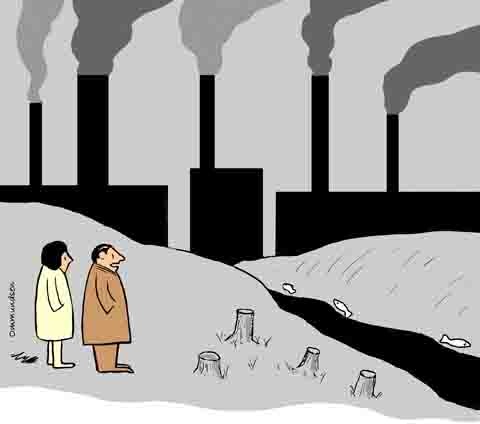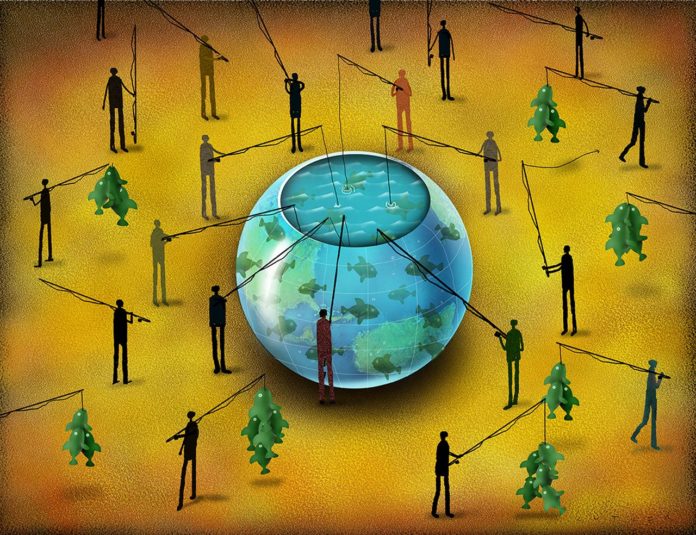The tragedy of the commons is a situation in a shared-resource system where individual users acting independently according to their own self-interest behave contrary to the common good of all users by depleting or spoiling that resource through their collective action.
The theory was originated in an essay written in 1833 by the British economist William Forster Lloyd [1]. The tragedy of the commons is a metaphor that applies to all natural resources to sustain humans such as energy, food, clean air, clean water, etc. There are global commons. The term is now used in social science and economics when describing a problem where all individuals have equal and unrestricted demand for a finite resource reducing the resource through over-exploitation, temporarily or permanently.

“Ruin is the destination toward which all [humans] rush, each pursuing [their] own best interest in a society that believes in the freedom of the commons. Freedom in a commons brings ruin to all.” Garrett Hardin.
Nowadays, the earth’s future hangs on a balance and governments around the world are taking actions to protect the global commons. The governments have understood that they do better when they cooperate with each other by creating opportunities to improve our world, by establishing policies (i.e. a set of rules for rational decision making) and strategies (i.e. a plan made to achieve goals and objectives). However, a change of such magnitude requires not only the cooperation of governments and organizations; but also the support and cooperation of each of us.
Therefore, one might ask: what is the situation of the Netherlands including Eindhoven, their citizens, expats and refugees in this context? Are we able to be pro-social as individuals to cooperate for the sake of something else: the natural environment? Why the action of policymakers is required? What role plays the human brain so that we can become a cooperative environmental society?
The Commons in the Netherlands
Europe is responsible for 10.5% of global greenhouse gas emissions (e.g. CO2, methane, nitrous oxide, etc.), to which the Netherlands contributes 0.5%. The emissions of the Netherlands are not negligible. Although the Netherlands has a worldwide reputation for being clean and green; it is one of the main polluters in Europe. It remains largely dependent on fossil fuels including coal. In fact, the Netherlands is the most dependent on fossil fuels of any country in Western Europe, with 91.77% of its energy needs being met by environmentally destructive fuels [3].
A brief history of fossil fuels in the Netherlands goes back to 1850, where the consumption of imported coal grew quickly and the country became almost self-sufficient. After World War II, it experienced a fast transition to oil dependence. In 1959 natural gas was discovered in Groningen. The fast introduction of natural gas diminished the role of coal, but dependence on imported oil and coal remained [4].
Limit carbon emissions from coal-fired power plants is a step in the right direction, but it simply will not be enough. The Netherlands was forced to agreed and coordinate on the closure of the five remaining coal-fired plants. In 2015, Urgenda, an environmental group, won a historic lawsuit against the Dutch government because of its lack of ambition in its emission reduction plans. The court ordered the government to cut emissions to 25% below 1990 levels (i.e. 225.9 million tonnes of CO2 [8]) by 2020. Even though the government appealed the judgment, the Parliament called for the phase-out of the remaining coal-fired power stations. Although the government was supposed to present its coal phase-out plan by the end of 2016, it has failed to take a decision on this [9]. The example of the Netherlands and other nations depicts the following viewpoint as Scott Barrett, a scholar on transnational cooperation, stated: “Countries are good at coordinating and bad at cooperating voluntarily.”

What is the impact of the phase-out of the Dutch coal plants? Two of the last five coal-fired power stations will close by 2020. The total closure of the power stations by 2020 will cost around 7 billion euros. Definitely, we should expect a sharp rise in electricity prices and unemployment. The last three newest coal-fired power stations will be closed by 2030 [11].
The Netherlands energy supply is going to change fundamentally over the coming decades. The Paris Agreement on climate change (i.e. a voluntary cooperation agreement) has set a target of limiting global warming to well below two degrees Celsius. This requires a drastic reduction in the use of fossil fuels, to close to zero by the year 2050. According to [12], the Netherlands plans to make use of Low Carbon emission energy sources such as solar energy, wind energy, biomass energy, geothermal heat and hydro-power for this purpose. The road-map towards energy sustainability is as follows:
- 14% Low Carbon emission energy by 2020;
- 16% Low Carbon emission energy by 2023; and
- Almost 100% Low Carbon emission energy by 2050.
Currently, it has not been a significant energy change in the Netherlands (e.g. In 2017 CO2 emissions in the Netherlands were at the same level as in 1990 [13]). Everything remains relatively the same: our consumption appetite. Despite the fact that technology is improving and becoming more efficient; we still require education besides the intellectual one. Why is it that the vast majority of us go about living our high-energy-consuming lives ignorantly as if climate change was the problem to be solved by someone else?
References
[1] en.wikipedia.org/wiki/Tragedy_of_the_commons
[2] tuftsdaily.com/opinion/2016/02/17/tragedy-of-the-commons/
[3] www.worldatlas.com/articles/countries-the-most-dependent-on-fossil-fuels.html
[4] Hölsgens, Rick. (2019). Resource dependence and energy risks in the Netherlands since the mid-nineteenth century. Energy Policy. 125. 45-54.
[5] nl.wikipedia.org/wiki/Kolencentrales_in_Nederland
[6] www.dutchnews.nl/news/2019/03/amsterdam-coal-fired-power-plant-to-close-four-years-early/
[7] www.hollandluchtfoto.nl/-/galleries/nautischoffshore/amsterdam-haven/-/medias/01c65bf5-5f35-46d3-ad40-b49afbd89f33-havengebied-met-centrale-hemweg
[8] ec.europa.eu/eurostat/statistics-explained/index.php/Greenhouse_gas_emission_statistics#Trends_in_greenhouse_gas_emissions
[9] Laurie van der Burg. Cutting Europe’s lifelines to coal. www.odi.org/sites/odi.org.uk/files/resource-documents/11479.pdf
[10] vivifychangecatalyst.wordpress.com/tag/pollution-of-ganga-river/
[11] www.nrc.nl/nieuws/2017/01/19/de-kamer-moet-het-zelf-maar-uitzoeken-6292049-a1542098
[12] www.government.nl/topics/renewable-energy/central-government-encourages-sustainable-energy
[13] nltimes.nl/2018/09/11/netherlands-co2-emissions-still-level-1990











